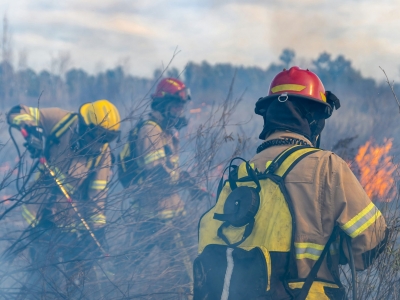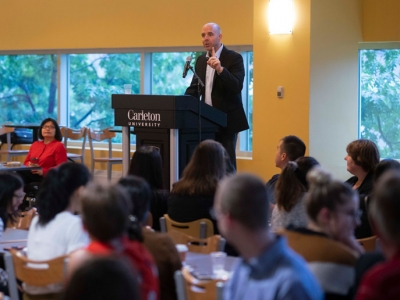By Dan Rubinstein
Africa is responsible for less than three per cent of global greenhouse gas emissions, yet it is the continent most vulnerable to the impacts of climate change, according to the United Nations.
Our warming world and unpredictable weather patterns result in hardships for Africans ranging from drought and desertification to flooding and the spread of waterborne diseases, which put pressure on natural resources and increase human migration. This, in turn, threatens food security, health, biodiversity and geopolitical security.
Understanding the scale and regional nuances of these pressing problems was the focus of From Climate Change to Environmental Sustainability: Challenges and Opportunities for Africa and Canada, a conference hosted by Carleton’s Institute for African Studies in the River Building on May 4.
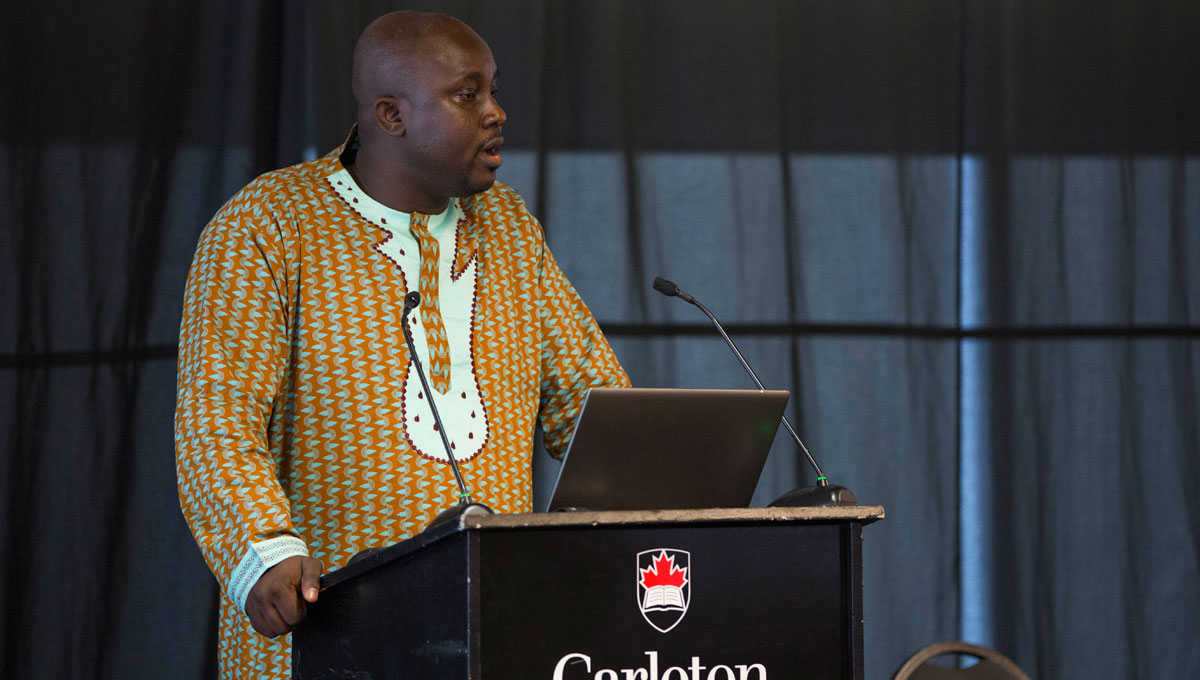
Pius Adesanmi, director of the Institute of African Studies and a professor in Carleton’s Department of English Language and Literature | Photo: Chris Roussakis
With panel discussions and presentations on subjects such as the unique impacts of climate change on women, innovations in agriculture and renewable energy, and policy solutions that foster resilience, the intent of the conference was to move beyond the “dominant narratives of vulnerability and victimization, of a hopeless and helpless continent subject to the vagaries of climate change,” said Pius Adesanmi, director of the institute and a professor in Carleton’s Department of English Language and Literature.
By bringing together academic researchers, African diplomats and representatives from Canada’s federal government and non-profit international development organizations, Adesanmi hopes that the gathering “brings to the fore local mechanisms of climate change mitigation and coping, and helps inform Canadian-African partnerships, so they’re not starting at zero.”
Farmers in a particular community might tap into traditional methods to contend with a challenge like soil erosion, he said, and it’s important that external parties know this context before developing projects to address the problem on a wider scale.
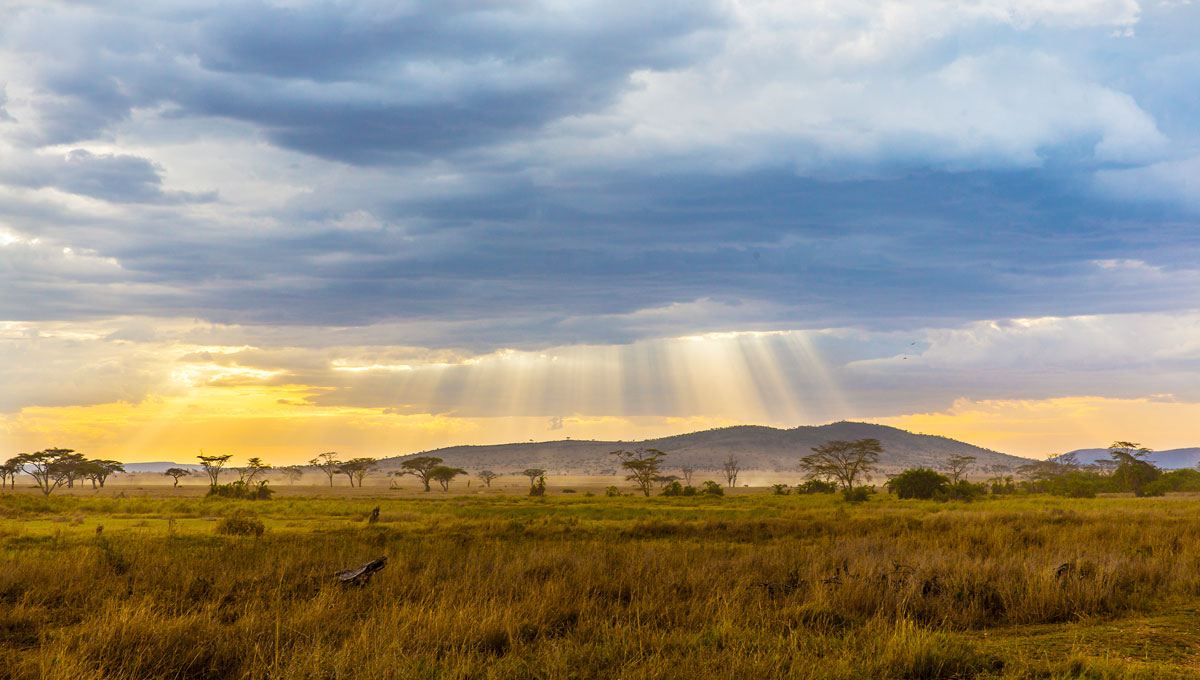
In her presentation, Beth Mburu, a PhD candidate in Carleton’s Department of Geography and Environmental Studies, talked about the impact of climate change on people in her study area in central Kenya.
In this high-altitude region near Mount Keyna dominated by small farms, many people have stopped growing millet because it’s too hot for the crop, because the once-dependable July and August rains no longer come, or because the millet is being eaten by birds drawn to the plants now that many of the area’s trees have been cut down.
“These are non-standard ways of measuring climate change,” she said, “but they’re all valid.”
Women do a lot of the farming in the region, said Mburu, but their husbands still have to sign consent forms when women get loans, because the land used for collateral is almost always in the man’s name.
Mburu see hope in the way traditional women’s groups known as “chamas” have responded. Women trade information, and give one another social and financial support. They pool money to buy cows and water tanks, and to pay for medical care for sick children.
“To me, this is what resilience looks like,” said Mburu. “Women are ready to take on their roles in leading action against climate change. Climate change is multifaceted and makes vulnerabilities more pronounced. But women don’t want top-down approaches, and we need to work together.”
Stephanie McDonald, a senior policy adviser with the Canadian Foodgrains Bank, a partnership of churches and church-based agencies working to end global hunger, focused on food security in her presentation.
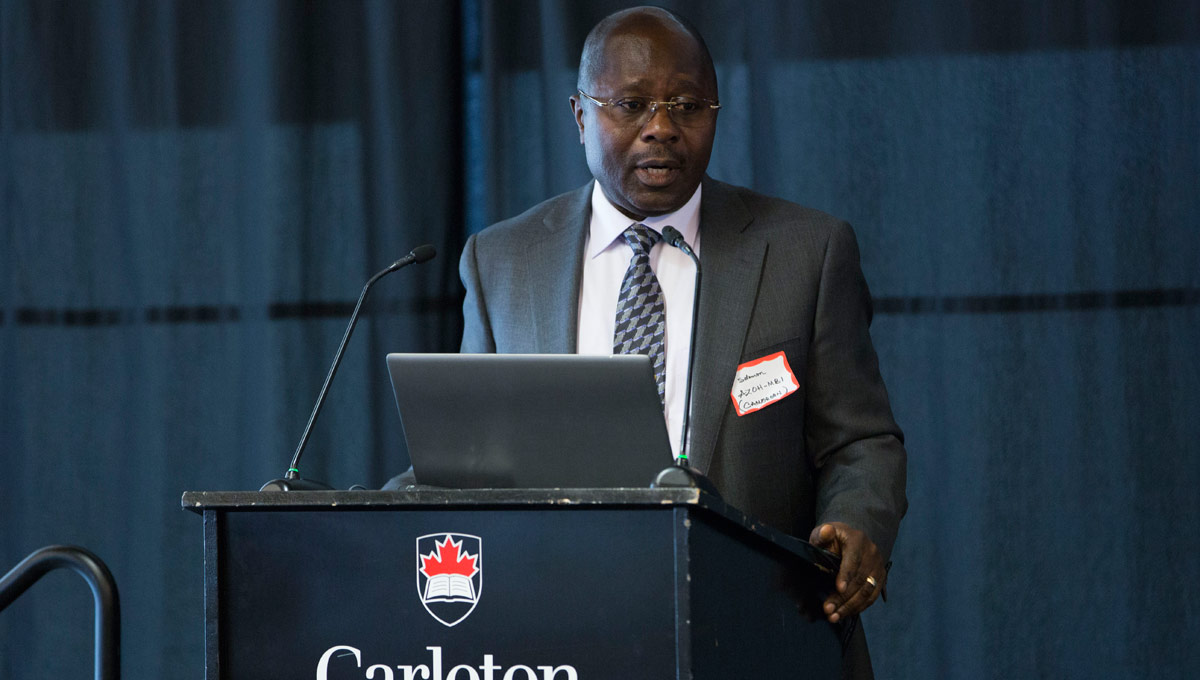
Anu’a-Gheyle Solomon Azoh-Mbi, Cameroon’s High Commissioner to Canada | Photo: Chris Roussakis
One in four people in Sub-Saharan Africa are malnourished, she said, 70 per cent of them small-scale farmers. Climate change is expected to make this situation worse. Most African farms are rain dependent; unpredictable rains, combined with drought and flooding, could reduce crop yields in Africa by more than 25 per cent by 2050.
But McDonald spoke of the potential for “conservation agriculture” to alleviate these impacts. Farmers can practice minimum tillage, leaving crop residue on fields and putting small amounts of fertilizer in each planting hole; they can cover soil with a layer of mulch, which helps to retain moisture; and they can practice crop diversification and rotation, breaking cycles of pests and disease, and protecting themselves against fluctuating markets for individual crops.
Conservation agriculture has the potential to reduce labour and increase yields, yet its uptake has been slow because of the initial labour required, and because governments tend to prefer mechanization and high-input farming.
The profit motive may be part of the problem.
Chris Huggins, a postdoctoral fellow at Wilfrid Laurier University, talked about the GSMA, a global association of mobile phone operators, and its work to promote the use of mobile agriculture tools in Africa.
The GSMA has produced a “women in agriculture” toolkit: female farmers can receive text messages about, for example, new crops, new approaches to composting and farm activity schedules. The toolkit also connects women to agribusiness suppliers and buyers.
These services are billed as part of an effort to “produce better farmers,” said Huggins, but can also been seen as “a long-term cross-channel promotional vehicle which conflates agricultural development with becoming smart consumers, and conflates gender equality with creating a new customer segment with purchasing power.
“The idea that African societies need to become information societies shares neoliberal consumptions about connectivity, that all connectivity is good,” he added. “Poor women in the global south are targeted and seen as efficient neoliberal subjects. Projects that intend to empower women can have unintended negative consequences.”
“We need to change farmers’ mindset,” one NGO worker was quoted as saying in a GSMA report. “They need to start treating farming like a business.”
This transformation, according to Oxfam, puts more demands on women’s time and increases domestic tension and violence.
Greater income is often seen as path to greater resilience, said Huggins. But it also means more exposure to markets, whereas a mixed household economy may be better, and help disperse risk.
Nicolas Chapuis, France’s ambassador to Canada, provided some context at the start of the conference with a speech about the legally binding global climate change agreement adopted by 195 countries at the COP21 talks in Paris last December.
“In Africa, there are lots of challenges, and lots of expectations about what the Paris agreement can do,” said Capuis. “The fight against climate change is an important engine for promoting sustainable development.
“Now we need to move the climate change conversation from global to local, to get from carbon addiction to detox and reconcile man with nature. Because of our hubris, we thought we could do whatever we wanted, and nature has bounced back like a boomerang.”
The next major international climate conference, COP22 in Morocco this November, will address head-on issues faced by Africa. Sustainable electrification, for instance, represents both a challenge and an opportunity.
Fifty per cent of Africans don’t have access to electricity, predominantly in rural areas, said Capuis. But just as China “leapfrogged” past land-line telephone and largely went straight to mobile service, Africa can move toward solar, wind and hydro power without getting mired in more polluting sources of energy.
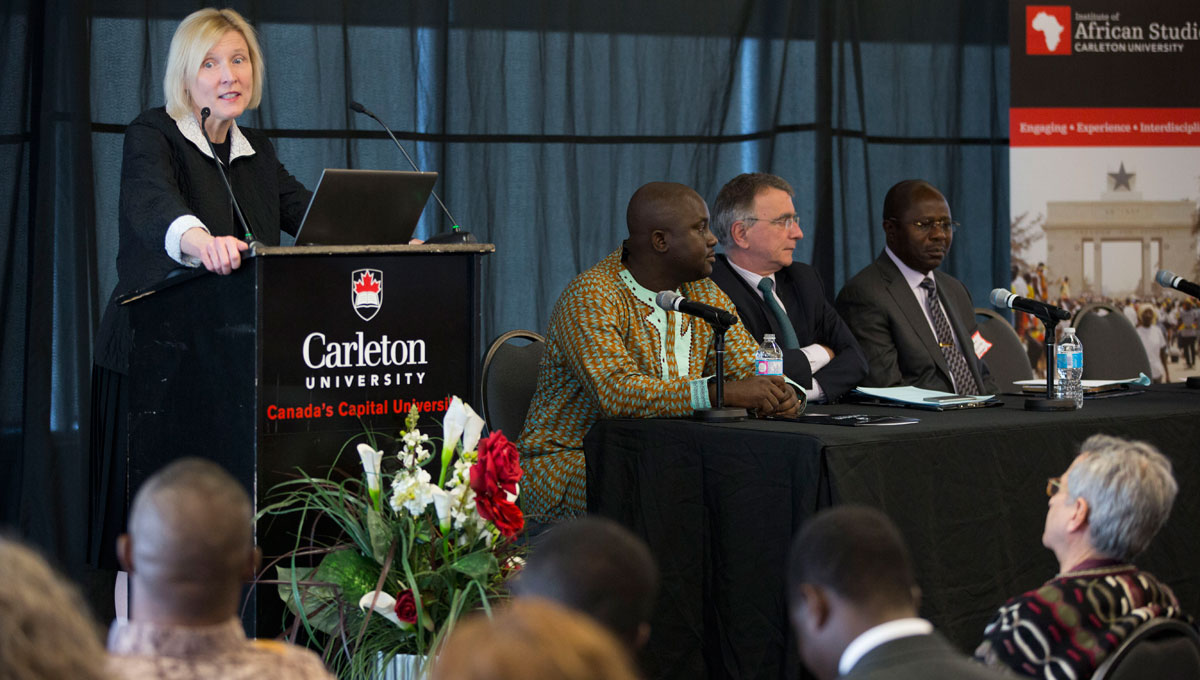
Africa’s largest wind energy project, in fact, began commercial operations in Morocco in 2014. The 131-turbine Tarfaya Wind Farm is expected to produce 301 megawatts of electricity, offsetting 900,000 tonnes of carbon dioxide emissions a year and powering 1.5 million households.
Africa is a net exporter of energy, Nouzha Chekrouni, Morocco’s ambassador to Canada, noted in her presentation. Thirty per cent of the continent’s population consumes 80 per cent of its energy, and people in Sub-Saharan Africa use 16 times less than the world average.
But renewable energy projects like the Tarfaya Wind Farm, and a Moroccan solar plan that aims to take advantage of the country’s 3,000 annual hours of sunlight, are a step toward sustainable development.
“Intact ecosystems ensure the survival of the poorest people,” said Chekrouni. “The imperative around the transition to clean energy is not only about climate change. It’s also about women’s health and gender equality. Africa has enormous potential.”
Thursday, May 5, 2016 in Environment and Sustainability, Innovation, International
Share: Twitter, Facebook

